As the lockdown gets lifted across Mumbai in phases, experts offer a 360-degree primer on necessary measures and precautions that need to be adopted by both employer and employee.

Rush hour at Thane station before the lockdown
Generic guidelines
ADVERTISEMENT

Basic facilities
"The basic principle underlying all precautionary measures to be undertaken is to consider every person and surface a possible source of infections, including yourself," says Dr Dillon D'Souza, ENT consultant and head and neck surgeon, Jaslok Hospital and Desa's Hospital. From the entry to the exit point, company facilities have to undergo a complete overhaul. These include:
. Disinfecting the premises before and after each day
. Installing foot-pedal sanitisers
. Conducting temperature checks
. Mandatory usage of masks
. Keeping an on-call doctor on standby
. Monitoring the usage of lifts to ensure distancing
. Changing seating layout

Dr Dillon D'Souza
To make things easier, top firms like Axis Bank, Godrej and Boyce Mfg Co Ltd, Bank of Baroda (BoB) and Motilal Oswal Financial Services Ltd (MOFSL) have been sending out simple presentations, with quirky hashtags and signage, to guide employees about the changes as well as encourage them to follow the new measures. These include tutorials on how to use masks and gloves, and how to maintain social distancing even inside the workplace.
In line with the government guidelines, most of these employers are also rolling out policies for a combination of in-office and at-home work to ensure the staggered return of employees. According to the Ministry of Home Affairs (MHA) guidelines released on April 20, companies should also maintain a list of COVID-19 hospitals nearby and encourage employees to use the Aarogya Setu app.
For the employer
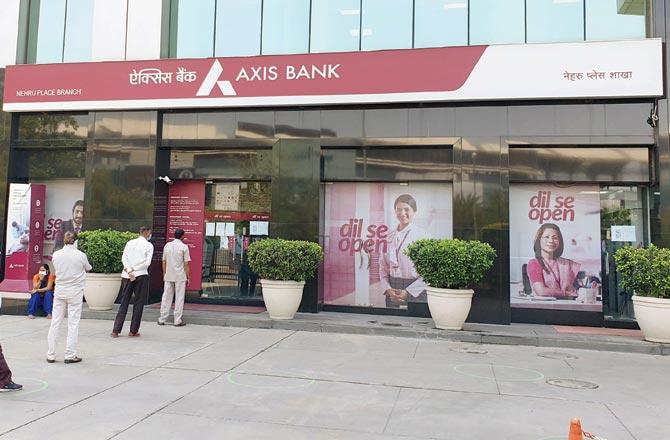
Customers maintain social distancing at an Axis Bank branch
Human resources
"We have not been in this situation before. And no one has past experience with transitioning back employees, so the process needs to be designed by senior leaders. And this falls directly in the remit of the HR team that will lead the effort," says Dr Shalini Lal, organisational development thinker and co-author of The Secret Life of Organizations (Hachette India). Here are some policies that the HR departments across industries will have to keep in mind.
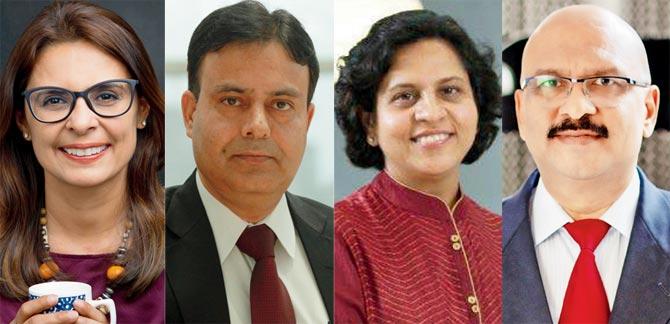
Dr Shalini Lal, Sudhir Dhar, Harpreet Kaur and Milind Jadhav
Attendance/leave
Staggered return: This seems to be the policy that workplaces will be following once the lockdown ends, while keeping in mind that the MHA guidelines state that persons above the age of 65 and those with kids below five years should be encouraged to work from home.
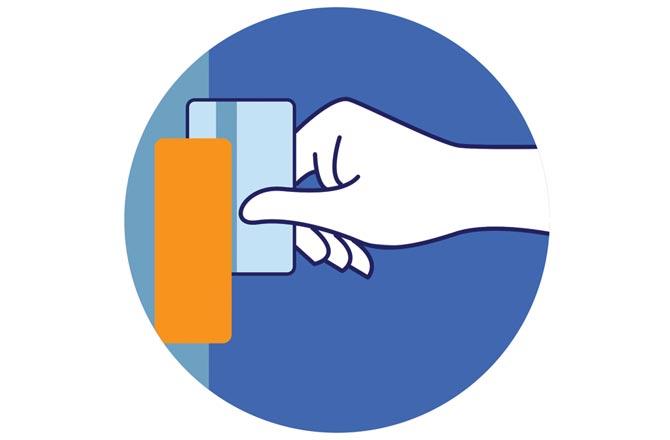
Harpreet Kaur, senior vice president and head, corporate personnel and administration, at Godrej & Boyce Mfg Co Ltd, says, "Based on the government order on the percentage of employees who can come to work, we will continue with both in-office and WFH options. Rosters will be based on the criticality of work required to be carried out in premises, travel distance, mode of transport, etc." Meanwhile, Axis Bank is rolling out a three-phase return policy. In the first phase, 10 per cent employees will return in large offices, followed by 30 per cent in the second phase and 60 per cent in the third, subject to norms laid down for
different zones.
Sudhir Dhar, executive director and head, HR, at MOFSL, tells us that employees will need to consider the following questions before returning — has my manager asked me to report? Is anyone from my family quarantined? Am I fit? "It will also depend on the temperature of employees while entering office."
Attendance system: This will have to take the no-contact route and companies may need to replace biometrics-based systems with other arrangements like apps that record attendance once the employee is in the GPS coverage area of the office premises.
Leave: Employers will need to deal with the inevitable demand for holiday leaves once employees can travel. Life and corporate coach Milind Jadhav feels that employers will have to be sensitive. "After all, the well-being of employees comes first. Employers can't have a blanket policy on this; otherwise they're inviting loss of productivity."
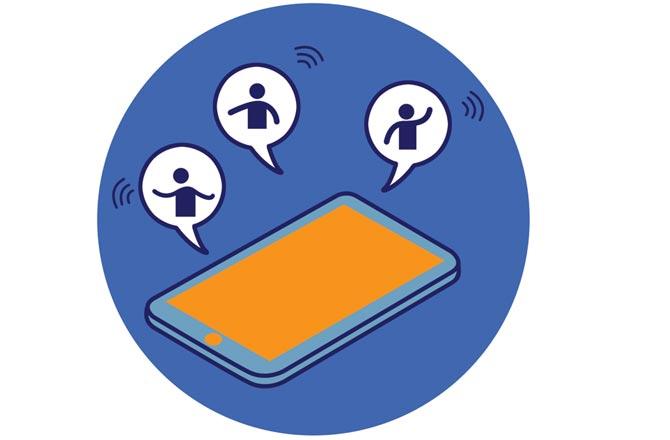
Meetings
Inside the workplace: Most employers and employees we spoke to tell us that the past two months have taught them that entire teams don't need to huddle for every single issue. Joydeep Dutta Roy, chief general manager and head, HR integration and strategic HR, at Bank of Baroda, says they have completely stopped holding physical meetings, even for those working at some of the branches. "Face-to-face meetings are only allowed between four to five employees in meeting rooms [by maintaining distance]. Virtual meetings are recommended for more than five people, and with guests and visitors," informs Dhar.
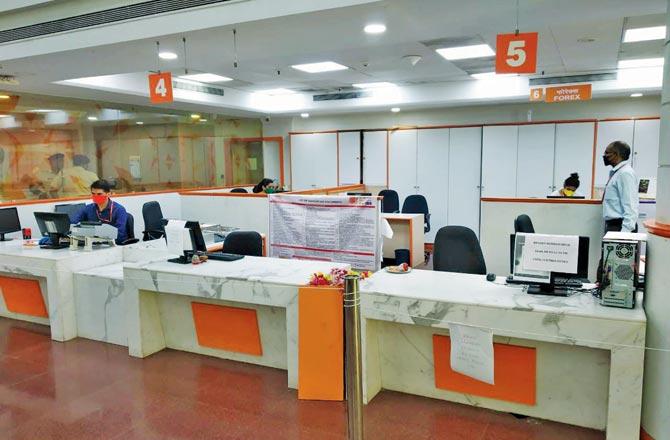
Social distancing norms being followed at a Bank of Baroda branch;
On-field meetings/consumer interactions: What happens to industries like public relations (PR) or advertising which are driven by client meetings, or the banking sector where consumer interaction can't be avoided? "We have provided employees with masks and sanitisers at every workstation. Cashiers have to mandatorily use gloves. Customers are allowed entry in the branch only if they wear masks and after they undergo thermal checks. We have mandated distance between employees and customers at counters," says Dutta Roy.

Joydeep Dutta Roy and Akshara Lalwani
Akshara Lalwani, CEO and founder of PR and brand solutions firm Communicate India, shares that they have explained to clients that all matters do not require physical meetings. "While currently we are strictly managing with virtual meetings, when the lockdown ends, we will hold physical meetings on a need basis," Lalwani adds.
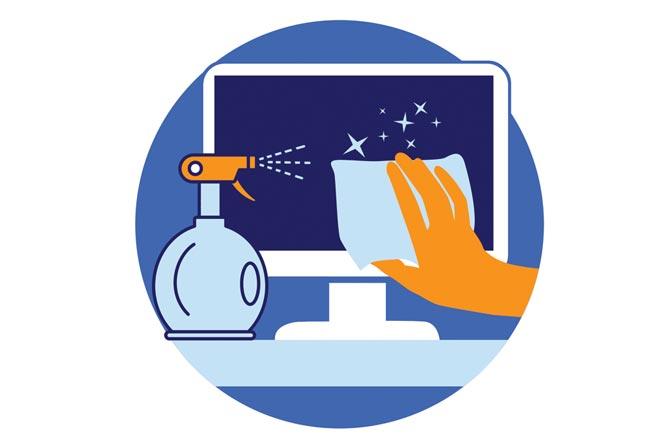
Office etiquette
Personal hygiene: What should an employee do to ensure their safety and those of their co-workers? Jadhav opines that social distancing should not be looked upon as a pain, but as the new normal to change our conduct in office. Dr Pritam Moon, general physician, Wockhardt Hospital Mira Road, says the most important thing that employees can and should do is wear masks. "Masks are the only thing that might be able to save you, apart from distancing. It also keeps you from touching your face. Wash your hands instead of using sanitiser if you have the option to do so as it's more effective. Also, disinfect your personal belongings and desk area," he adds.

Huawei employees eat lunch in a cafeteria at the company's headquarters in Shenzhen, China, post the lockdown. Pic/Getty Images
Dr D'Souza suggests we avoid touching public utility systems including coffee, photocopy and printing machines, or even common doors and railings. "Avoid sharing things with others, and use hair as well as face masks."
Employee behaviour: Manuals being sent out by companies including Axis Bank, Godrej & Boyce, BoB and MOFSL mandate wearing of masks and gloves, social distancing inside office premises, keeping in touch through call, text, email or apps, and greeting with a namaste. They prohibit any kind of socialising. "A paperless office has been initiated and bank employees are provided training to work smoothly using e-tools and apps," said Dutta Roy.
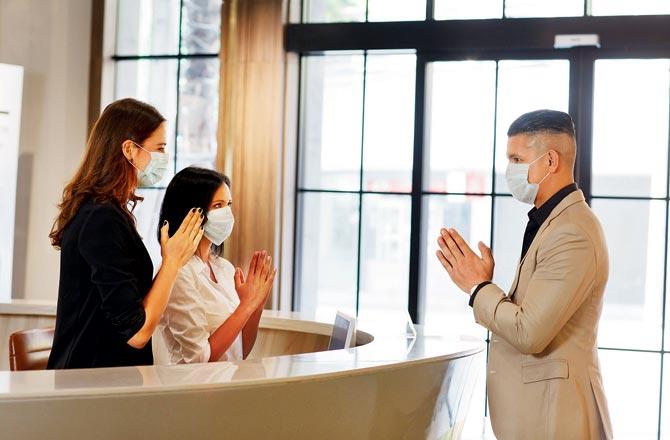
One must be mindful to greet with a namaste, instead of a handshake
Food
While Dhar tells us that they have encouraged employees to carry their own food and water, and eat at their desk, Rajkamal Vempati, head HR at Axis Bank, shares that cafeteria timings will be staggered.

Dr Pritam Moon and Rajkamal Vempati
"Employees need to 'hang out' online, rather than in cafeterias and have been asked to get their own food and cutlery," she adds.
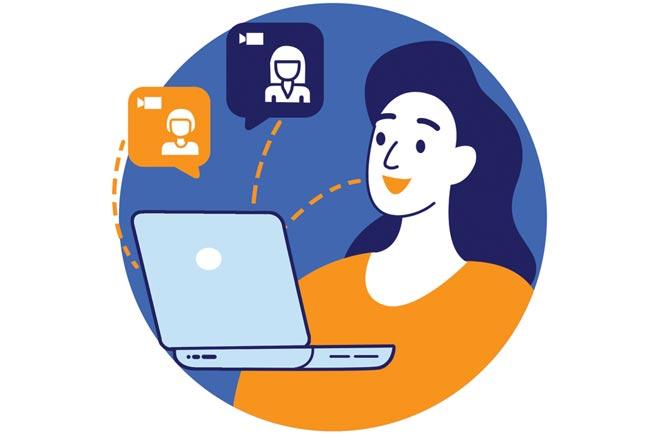
Hiring/return of furloughed members
In case HRs plan to hire staff for teams that have been short-staffed prior to or during the lockdown, the process needs to go online. "The past few weeks have shown us that video calls are as good a medium as any to communicate and HR departments need to accept this as the new way of doing things. When you recruit, you need to keep in mind not just the competency of the candidate, but also the character, both of which can be gauged online," says Jadhav. Dr Lal, meanwhile, suggests that those hired during the lockdown should be brought in to the office if possible so that they don't feel left out. During the lockdown, many employees were placed on leave without pay. Company heads and HR will also need to help them get reoriented and allay their fears and concerns.
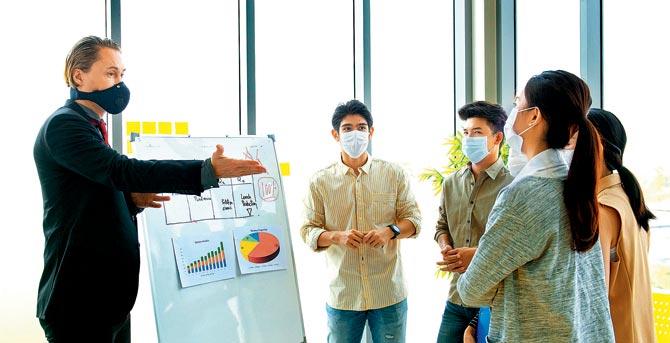
Physical meetings, if absolutely necessary, should follow all protocols
Work-life balance
Drawing from the fact that some state governments have suspended labour laws for the next few years, it is expected that businesses might get exploitative to combat the recessive phase or just to "make up" for the WFH loss. Dr Miloni Sanghvi, a psychologist and outreach associate at MPower, The Centre Mumbai, feels that to tackle this pressure, employers and employees must view themselves as part of the same family.

Dr Miloni Sanghvi
"Organisations must practise transparency. As we come out of this lockdown, businesses should place a greater emphasis on ethical practices. Rather than mindlessly extending work hours or having employees work on weekends, which goes against the employment contract, employers should collaborate with employees on devising an extended rota together. Employees, too, must be geared to expect changes," she adds.
Mental headspace
After more than two months of working from home, going back to a physical set-up might be a jarring experience. Kaur says that Godrej & Boyce plans to gradually ramp up work for this reason. "We are encouraging employees to come up with ideas on how we can contribute to lighten things up, post the lockdown," she shares. Here are some other tips shared by coach Jadhav and Dr Sanghvi:
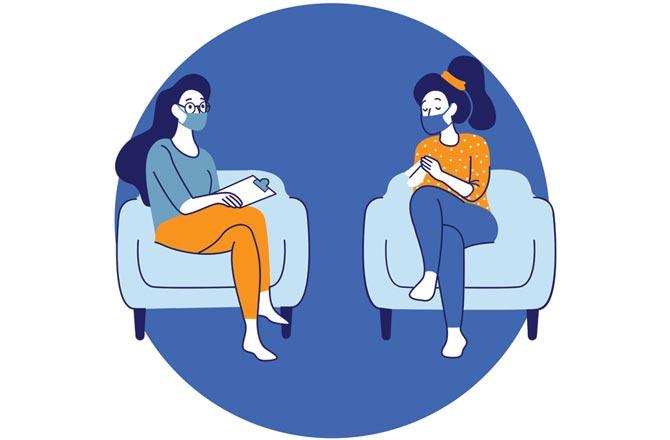
. Don't clock long hours for the first few days and factor in some drop in productivity. Once you get into a rhythm and get the flow back, you will notice an increase in energy levels.
. In the first week after the lockdown ends, relate to what your colleagues must be dealing with and support each other. Employers need to be sensitive about this and encourage workers to open up about their feelings.
. Although you may be going back to the same workplace, a lot will change. Be attentive to the internal and external shifts that have taken place.
. Employees will have to manage their time and more importantly, their energy mindfully to make sure they compartmentalise work life and personal life.
Office entertainment
The lockdown has been a difficult phase with reports of salary cuts and lay-offs across sectors. Employers will need to keep their staff motivated through office entertainment, without coming across as insensitive. Dr Sanghvi suggests selecting appropriate themes and activities that garner gratitude. "This should come with an acknowledgement of the challenges that have resulted from this economic downturn. Be mindful of expenditures for these added luxuries. It's grossly insensitive to slash salaries to cut costs while putting money towards office entertainment," she says. Jadhav urges employers to also look for cost-effective options like online antakshari that can be engaging.

Jaspreet Bindra
Up-skilling
Many employees might have to take on additional responsibilities because of the reduced staff strength during this time. Moreover, since digital communication and e-tools are now absolute essentials, companies should use this time to up-skill employees. Jaspreet Bindra, founder of digital transformation advisory firm Digital Matters, and author of Tech Whisperer (Penguin India), says that employees need to have a working knowledge of collaboration and conferencing software like MS Teams, Zoom, Slack, etc. "This will be as important as knowing Word or Excel or Powerpoint. Collaboration and teaming across remote locations to prepare for work from anywhere is another skill which must be learnt," he adds.
Face-to-face learning should be limited to small groups. "HR will need to re-imagine both behavioural and functional training modules to suit the hybrid model of working. It is not sufficient to just take what is offline and deliver the same online. Trainers need to be comfortable teaching online, too," Bindra explains.

Experts feel that the lockdown has given rise to a hybrid culture - a combination of WFH and in-office work - which MOFSL employees have been practising
Wfh back-up
The lifting of the lockdown in a city like Mumbai might clash with the arrival of the monsoon. Moreover, there are reports of a second wave of the virus that might hit us. "WFH is not going to go away even after the lockdown. It will become a way of life, with a certain percentage of employees always working from home. The future is hybrid working, which firms should prepare for," predicts Bindra.

Smart hacks to distancing
. If a boardroom has 20 chairs, remove 10 to ensure that a crowd isn't encouraged to gather in the room.
. Work on creating fun signage and hashtags to encourage employees to follow social distancing norms. MOFSL has a #JanHitarthJari checklist for employees, while Axis Bank is using phrases like "chessboard seating" and "99°F is the new cool" to deliver the message.
. Create rosters carefully to ensure that entry and exit points are not crowded with people at the start and end of the day.
Admin & support staff
Visitor check and security
Both Dr D'Souza and Dr Moon suggest that visitors or guests should not be allowed on office premises. Dr D'Souza suggests that if necessary, companies can designate a spot or room for meetings with limited number of visitors, preferably on the ground floor, but that too has to be disinfected after each meeting. Companies like MOFSL and Axis Bank are asking employees to not invite visitors to the office premises. They are also keeping a tab on delivery personnel, agents, courier services, etc, entering the premises. Although anti-viral sprays have been suggested by many to sanitise goods entering the office, Dr D'Souza says, "The only kind of spray effective against the virus is that which releases large amounts of chlorine, which affects the lungs. So, if you are using it, there needs to be an open space with access to good sunlight and ventilation."
Often, and especially in larger workspaces, security might turn lax. However, this will need to change to ensure stricter access and control of non-staff personnel in the premises.
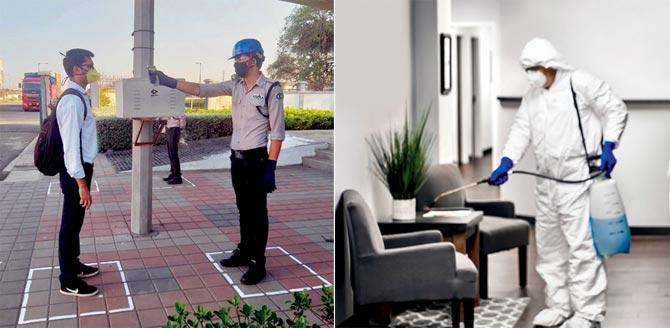
If visitors are allowed into an office, they should also go through thermal screening or temperature checks, like at this Godrej and Boyce facility; (right) all points of common contact in the office should be disinfected
Sanitisation and house-keeping staff
Dr Moon suggests that apart from the seating area, washrooms, pantries, entry and exit points, lifts, door knobs, railings, stairways and all points of common contact should be regularly sanitised. "Employees should disinfect their own desks, too, before they start working and before they leave," he says. In its manual to employees, a private sector bank has stated that employees should use doormats dipped in disinfectant at the entrance points to clean their shoe soles before entering the building. "If companies are getting people to service machines, whether ACs or printers, it should be done two to three days in advance when nobody is in office, after which the premises should be disinfected," says Dr D'Souza. Companies should keep an eye out for the safety of housekeeping staff, especially those involved in collecting garbage. They should be given appropriate PPE gear.
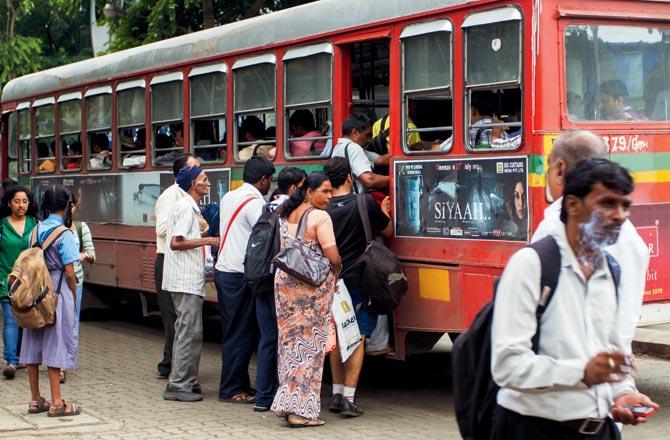
Experts are of the opinion that an effective plan for public transport needs to be worked out before people can return to their workplaces
Transport
While public transportation might take time to resume after the lockdown ends, and won't be a safe option, it's one of the main reasons employees may be hesitant to return to the workplace. Companies like MOFSL are encouraging workers to return only if they have their own vehicle, or use a carpool service in which maximum two people should travel. "Employees have been advised to use personal vehicles only as far as possible or make car-pool arrangements with only one or two people at any given point of time. In cases where both are not possible, the bank has made arrangements by organising buses or hired vehicles. However, the number of persons inside the vehicles is restricted as per government norms and to ensure social distancing," said Dutta Roy of Bank of Baroda.
Policy

Revised floor plan
When you return to office, chances are that your desk might not be the same. You might have to even say goodbye to your work neighbour who could be shifted two to three seats away, thanks to social distancing norms. Architect Pranav Naik of Studio Pomegranate suggests, "Workers should leave at least two desks empty between each other, and have a small removable barricade in between so no one inadvertently crosses each other's path. Cafeterias and large break rooms could also be used to fan out the workers across the premises." Naik also reiterates that workplaces should bring back employees in a staggered manner to avoid crowding, which is unavoidable in smaller offices in Mumbai. In its manual to employees, Axis Bank stated that they will be introducing an app for employees to book a seat in their large offices before they leave for work from home.
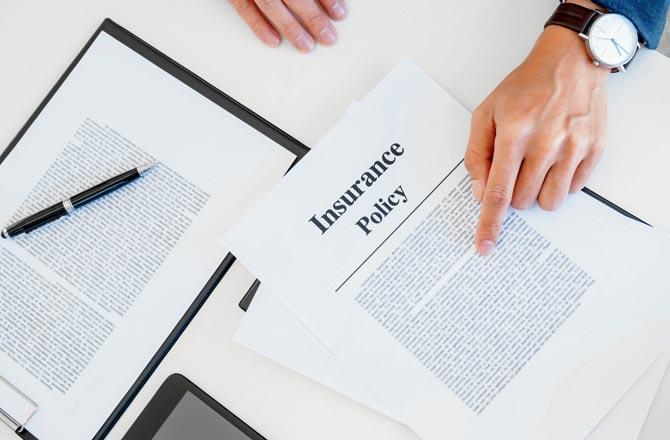
It's mandatory to have a health insurance to go back to office
Insurance
Insurance expert Kapil Mehta says health insurance is mandatory if you're going back to work. "Every single health insurance in the market covers the hospitalisation charges of COVID-19. Companies need to offer it to employees. Additionally, firms can opt for variants that offer fixed benefits if you're diagnosed positive to effectively take care of all expenses," he said.

Kapil Mehta and Pranav Naik
Containment zones and exit strategy
Employers can send a guide to employees demarcating what is allowed in the three green, red and orange zones. In case a worker tests positive, Dr D'Souza suggests complete quarantine of everyone in the office for 14 days. HRs should send clear guidelines to employees to avoid panic. According to the May 18 MOHFW guidelines, any staff suffering from "flu-like illness should not attend office and seek medical advice from local health authorities." If one or few persons who share a closed office space is/are found suffering from symptoms, "place the ill person in a room where they are isolated. Provide a mask till he/she is examined by a doctor. Report to concerned health authorities. Helpline 1075 will be immediately informed."

Firms should invest in cyber risk quantification systems during this time
Digital cleansing/security
The office space isn't the only area that needs to be sanitised. IT teams will also have to cleanse all the office systems that people have been connected to from home, since workers might have downloaded software outside of their office work on them. "Organisations should do a complete check of their employees' systems when they return from WFH. We have seen instances where chat apps, games etc, that were downloaded were filled with malwares that affected sensitive office data. Workers should always download applications from the official store and not from the vendor website or third party stores, especially when using office systems," says data security expert and co-founder of Lucideus, Rahul Tyagi.

Rahul Tyagi
There are many risks involved in confidential data leaving the office premises and being accessed remotely by employees, adds Tyagi. "The efficiency of existing privacy systems will need to be tested to see if new ones need to be put in place. There can be various scenarios of data loss if systems are compromised, and this is exactly why organisations need to invest in cyber risk quantification platforms. For example, if an employee's system is compromised, such platforms can detect this anomaly and prompt the security teams," he adds.
Be careful of central air conditioners
Architects and doctors both warn of the ill effects of central air-conditioning in offices. "The virus survives for at least three weeks in cold conditions inside the ducts," says Dr D'Souza, adding ventilation must be available in offices. Naik suggests that offices should retro-fit HEPA (high efficiency particulate air) filters to their air-conditioning systems. "HEPA filters will catch all small particles, including most virus particles. Baffles of ACs should also be installed or vents should be turned away from the direction of workers," he adds.
For the employee
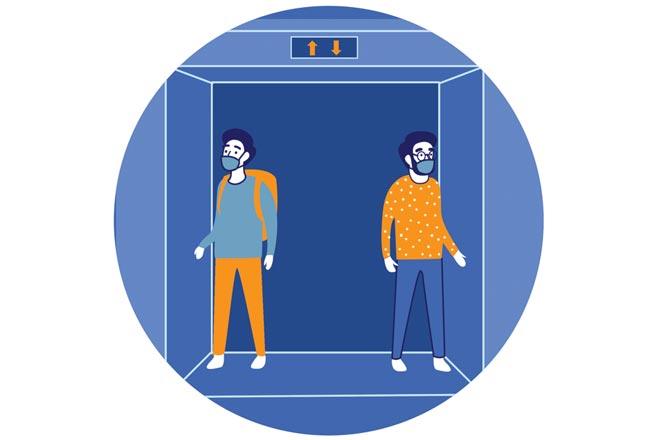
Commute care
HR departments of companies should provide step-by-step guidelines on how staff should care for themselves during and after their daily commute.
. Dr Moon suggests that employees wear masks and gloves at all times, from the moment they step out of home.
. Shoes and bags must be disinfected upon reaching home, and clothes must be washed.

Blocks marked on the ground for employees to stand apart at a Godrej & Boyce facility
. At the end of the day, care should be taken that not all employees rush to leave work together as otherwise it may lead to crowding in stairways, lifts and exit paths.
. Hand sanitising stations should be installed at the entry and near high contact surfaces, according to the MOHFW guidelines.

Illustrations/Uday Mohite
What to carry to office
. The contents of your office bag are likely to change post the lockdown. Dr Moon suggests keeping belongings to a minimum to avoid exposing too many of them to the virus. If you have a laptop or computer at work, avoid carrying a laptop.

. "Wear the mask. Keep a sanitiser, your lunch, phone and water in the bag. Consider packing each item in sanitised plastic covers or bags," he adds.
. Consider creating a digital signature to avoid using pens and touching paper.
What happens to co-working spaces?
Mumbai has a number of co-working spaces, some of which double up as cafés. Co-working space WeWork, which has 12 units in Mumbai with members including businesses and freelancers, has currently kept all offices shut. "All our buildings are being fumigated and sanitised. We are encouraging all members, employees and vendor personnel to practise social distancing. We have also suspended all internal and external events indefinitely. Spaces in common areas and conference rooms are being reviewed and modified to ensure a minimum of six feet distance between two people. We have also mandated temperature screenings outside our buildings for all members," said head of operations Raghuvinder Singh Pathania. To provide an extra layer of security in terms of access, WeWork will also implement business hour restrictions.
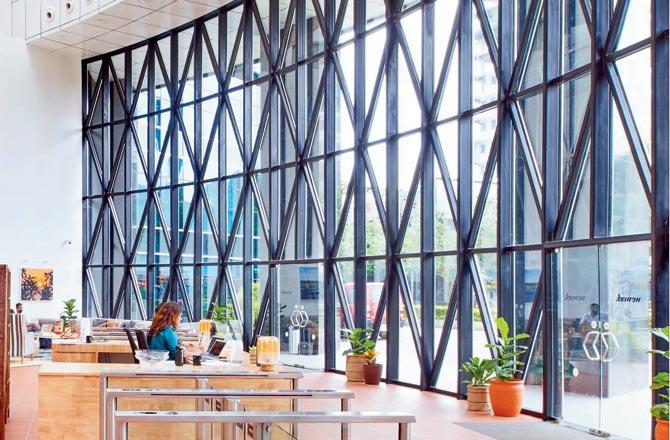
A semi-empty WeWork unit in Mumbai where markings have been made on the floor to maintain distance
What does this mean for the future of co-working spaces? "Many companies, depending on their nature of businesses, will reduce their dependence on utilisation of offices and consider flexible working schedules. We believe this situation is an opportunity as companies would not want to invest in fixed assets like real estate, which may result in them operating from spaces like ours to save overhead costs," adds Singh Pathania.

Raghuvinder Singh Pathania
Catch up on all the latest Mumbai news, crime news, current affairs, and a complete guide from food to things to do and events across Mumbai. Also download the new mid-day Android and iOS apps to get latest updates.
Mid-Day is now on Telegram. Click here to join our channel (@middayinfomedialtd) and stay updated with the latest news
 Subscribe today by clicking the link and stay updated with the latest news!" Click here!
Subscribe today by clicking the link and stay updated with the latest news!" Click here!






